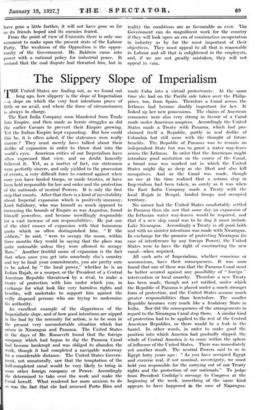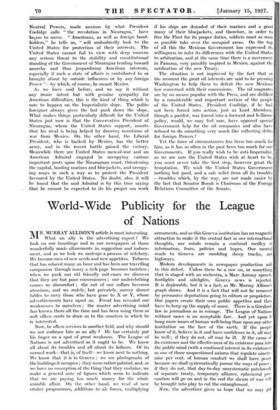The Slippery Slope of Imperialism
THE United States are . finding out, as we found out long ago, how slippery is the slope of Imperialism —a slope on . which the very best intentions prove of little or no avail, and where the force of circumstances is always in charge.
The East India Company soon blundered from Trade into Empire, and then made as heroic struggles as did the earlier Caesars to prevent their Empire growing. Yet the Indian Empire kept expanding. But how could this be, it is often asked, if the statesmen were really sincere ? They must merely have talked about their dislike of expansion in order to throw dust into the world's eyes.. American critics of our Imperialism have often expressed that view, and no doubt honestly believed it. Yet, as a matter of fact, our statesmen were perfectly sincere, and only yielded to the procession of events, a very difficult force to contend against when once you have landed troops, or made treaties, or have been held responsible for law and order and the protection of the nationals of 'neutral Powers. It is only the first step that counts. After that there is a kind of inevitability about Imperial expansion which is positively uncanny: Lord Salisbury, who was himself as much opposed to increasing the bounds of Empire as was Augustus, found himself powerless, and became unwillingly responsible for a vast increase of our responsibilities. He put one of the chief causes of expansion with that humorous gusto which so often distinguished him. " If the soldiers," he said, " were to occupy the moon, within three months they would be saying that the place was quite untenable unless they were allowed to occupy Mars." Another fruitful cause of expansion is the fact that when once you get into somebody else's country and try to limit your commitments, you are pretty sure to be asked by " the local power," whether he is an Indian Rajah, or a usurper, or the President of a Central American Republic threatenesi by a rival, to make a treaty of protection with him under which you, in exchange for what look like very harmless rights and benefits, will undertake to support him against the evilly disposed persons who are trying to undermine his authority.
An excellent example of the slipperiness of the 'Imperialistic slope, and of how good intentions are nipped in the bud by the necessity for action, is to be seen in the present very uncomfortable situation which has arisen in Nicaragua and Panama. The United States in the days..of Mr. Roosevelt found that the foreign company which had begun to dig the Panama Canal had become bankrupt and was obliged to abandon the .work, though it had completed a navigable waterway for a considerable distance. The United States Govern- ment, not unnaturally, saw that the temptation of the half-completed canal would be very likely to bring in some other foreign company- or Power. Accordingly she determined to take over the work and make the Canal herself. What rendered her more anxious to dO so was the fact that she had annexed Porto. Rico and made Cuba into a virtual protectorate. At the same time she had on the Pacific side taken over the Philip- pines, too, from Spain. Therefore a Canal across the Isthmus had become doubly important for her. It linked up her new possessions. The claims of American commerce were also very strong in favour of a Canal made under American auspices. Accordingly the United States made a Treaty with Panama, which had pro- claimed itself a Republic, partly in real dislike of Columbia but still more with the thought of future benefits. The Republic of Panama was to remain an independent State but was to grant a water way-leave across the Isthmus. In order that the Americans might introduce good sanitation on the course of the Canal, a broad zone was marked out in which the United States might dig as deep as she liked and also kill mosquitoes. And so the Canal was made, though no one a the time realized that a serious step in Imperialism had been taken, as surely as it was when the East India Company made a Treaty with the local Rajah in Bengal, landed troops and occupied territory.
No sooner had the United States comfortably settled in Panama than she saw that some day an expansion of the Isthmian water way-leaves would be required, and that if a new ship canal was to be dug it must include Lake Nicaragua. Accordingly a Treaty in all good faith and with no sinister intentions was made with Nicaragua. In exchange for the promise of protecting Nicaragua (in case of interference by any foreign Power), the United States were to have the right of constructing the new canal,--when required.
All such acts of Imperialism, whether conscious or unconscious, have their consequences. It was soon found that one of these was that the Panama ('anal must be better secured against any possibility of " foreign " intervention or local anarchy. Therefore a new Treaty has been made, though not yet ratified, under which the Republic of Panama is placed under a much stronger form of protection, and the United States assume much greater responsibilities than heretofore. The smaller Republic becomes very much like a feudatory State in India. Nor did the consequences of the arrangements in regard to the Nicaragua Canal stop there. A similar kind of protection had to be applied to the rest of the Central American Republics, or there would be a leak in the barrel. In other words, in order to make good thi position into which America had gradually slipped, the whole of Central America is to come within the sphere of influence of the United States. There was immediately yet another result. The neutral Powers said to us in Egypt forty years ago : " As you have occupied Egypt and exercise real, if not nominal, sovereignty, we must hold you responsible for the carrying out of our TreAty rights and the protection of our nationals." To judge from President* Coolidge's message to Congress at the beginning of the week, something of the sane kind appears to have happened in the • case of Nicaragua'. Neutral Powers, made anxious by what President Coolidge calls " the revolution in Nicaragua," have begun to move. " Americans, as well as foreign bond- holders," he tells us, " will undoubtedly look to the United States for protection of their interests. The United States cannot fail to view with deep concern any serious threat to the stability and constitutional standing of the Government of Nicaragua tending toward anarchy and thus jeopardizing American interests, especially if such a state of affairs is contributed to or brought about by outside influences or by any foreign Power "—by which, of course, he meant Mexico.
As we have said before, and we say it without any ironic intent but with genuine sympathy for American difficulties, this is the kind of thing which is sure to happen on the Imperialistic slope. The polite foreigner always gives the last push down the slope. What makes things particularly difficult for the United -States just now is that the Conservative President of Nicaragua, whom the United States support, asserts that his rival is being helped by drawing munitions of war from Mexico. On the other hand, the Liberal President, who is backed by Mexico, has the better army, and in the recent battle gained the victory. Meanwhile there are United States men-of-war and an American Admiral engaged in occupying various important posts upon the Nicaraguan coast, threatening the capital, landing marines and bluejackets, and occupy- ing zones in such a way as to protect the President favoured by the United States. No doubt, also, it will be found that the said Admiral is by this time saying that he cannot be expected to do his proper sea work if his ships are denuded of their marines and a good many of their bluejackets, and therefore, in order to free the Fleet for its proper duties, soldiers must as soon as possible take over the occupied areas. On the top of all this the Mexican Government has expressed its willingness to refer its differences with the United States to arbitration, and at the same time there is a movement in Panama, very possibly inspired in MeXico, against the ratification of the new Treaty.
The situation is not improved by the fact that at the moment the great oil interests are said to be pressing Washington to help them to defeat the new Mexican law concerned with their concessions. The oil magnates arc by no means popular with the Press, and are disliked by a considerable and important section of the people of the United States. President Coolidge, if he had not been forced into action, just as Lord Aberdeen, though a pacifist, was forced into a forward and bellicose policy, would, we may feel sure, have opposed special Government help for the oil companies and also have refused to do something very much like collecting debts for foreign Powers !
Yet the force of circumstances has been too much for him, as it has so often in the past been too much for our Governments. If you really wish to be anti-Imperialist, as we are sure the United States wish at heart to he, you must never take the first step, however great the temptation. We wish the United States Govermuent nothing but good, and a safe relief from all its troubles —troubles which, by the way, are not made easier by the fact that Senator Borah is Chairman of the Foreign Relations Committee of the Senate.



































 Previous page
Previous page